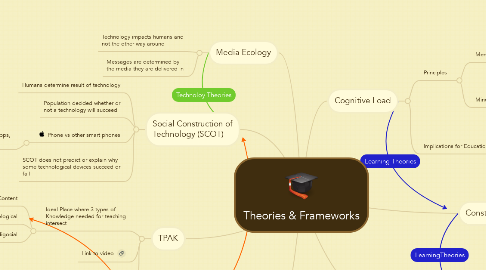
1. Social Construction of Technology (SCOT)
1.1. Humans determine result of technology
1.2. Population decided whether or not a technology will succeed
1.3. iPhone vs other smart phones
1.3.1. Other smart phones may have better technology but iPhones have more apps, cases, and hype
1.4. SCOT does not predict or explain why some technological devices succeed or fail
2. Media Ecology
2.1. Technology impacts humans and not the other way around
2.2. Messages are determined by the media they are delivered in
3. TPAK
3.1. Ideal Place where 3 types of Knowledge needed for teaching intersect
3.1.1. Content
3.1.2. Technological
3.1.3. Pedigocial
3.2. Link to video
3.3. Improve upon as you develop as a teacher
4. Philosophy of Technology
4.1. Adapted from Philosophy of Teaching
4.2. A creed that teachers develop themselves about how they will choose to use technology in their classroom as a tool to aid in teaching
4.3. Can include a variety of technological tools
4.4. How I feel I should use technology and how my future student swill use technology
5. Connectivism
5.1. Principles
5.1.1. Connecting ideas and concepts
5.1.2. "Where" is more important than "how" and "what" in media network
5.1.3. Currency of information
5.2. Implications for Education
5.2.1. Continual Learning
5.2.2. Use technological tools like twitter, Facebook, Skype, newsreaders and search engines
6. Cognitive Load
6.1. Principles
6.1.1. Memory model
6.1.1.1. Sensory Memory
6.1.1.2. Working memory
6.1.1.3. Long term Memory
6.1.2. Mind maps
6.1.2.1. Organization
6.1.2.2. Layout information
6.2. Implications for Education
6.2.1. Teacher needs to be aware of amount of information being delievered
6.2.2. Use technological tools such as prezi and mindmaps
7. Constructivist
7.1. Principles
7.1.1. Problem solving
7.1.1.1. Collaborative learning
7.1.2. Build connections through environmental interactions
7.1.2.1. Discovery learning
7.2. Implications for Education
7.2.1. Time Consuming
7.2.2. More advanced learning
7.2.3. Complex and difficult to assess
7.2.4. Use technological tools such as scratch and lego robotics
